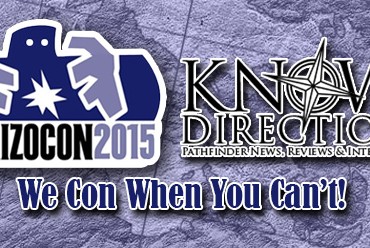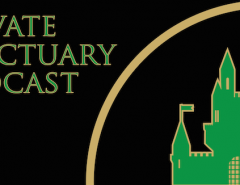The Man Behind the Screens and the Everyman Gamer are back for another exciting episode of the Private Sanctuary Podcast! In this installment, Anthony and Alex confront the most terrifying fate that can befall any Player Character at any moment: death. Between the two of them, Anthony and Alex have built up over a dozen pages on the subject, and now they’re finally ready to bring their thoughts and ideas to bare on the Private Sanctuary Podcast!
Listen Now!
This episode only has one big topic, Death and Dying, so instead of the usual show notes, we at the Private Sanctuary humbly offer you links to Anthony and Alex’s articles on the topic of death. Enjoy!
Behind the Screens: Total Party Kill (Anthony)
Also, be sure to tell us what you think of our podcast’s new cover image!
Podcast: Play in new window | Download





I think one aspect of Raise Dead that was missed on the podcast is that the cost of Raise Dead has to explain why all the NPC’s that populate the campaign setting don’t use Raise Dead on themselves all the time. The high cost of the material components helps explain why only incredibly rich people would be able to afford it.
Actually, I did address it in the podcast when I mentioned that a material component cost of 500 gp is expensive enough that only NPCs who can afford living expenses of 1,000 gp/month can afford a raise dead spell. Basically, a character earning gp with a Craft, Perform, or Profession skill will typically earn about four times her living expenses, so a character with a living expense of 1,000 gp/month is likely to actually earn about 4,000 gp. 1,000 gp/month is considered fantastically wealthy, the highest living expense in the Core Rulebook, and NPCs who earn that much gold month are STILL unlikely to be able to afford a raise dead spell because it takes then about one month to earn that much money, but a raise dead cast by a 9th level caster (the minimum needed to cast the spell) must be cast within 9 days (just over one week) for it to even work.
I go into greater detail about the mathematics involved in raise dead in my Guidance article, Death and Taxes, which is linked above. This is why Anthony and I make only a brief mention of why NPC use can’t be considered a factor in raise dead’s price; by the game’s own rules, only characters who are wealthy beyond the game’s wealthiest living expenses can afford to cast raise dead before the limitations imposed by the spell wear out.
I was reminded of a death mechanic that I used in my own Giantslayer campaign.
My group was a couple of levels ahead of the curve on the campaign path when they started (they were 5 for the level 1 part) but this was really only an issue for the combat parts, which are easily tweaked.
During one of the big fights near the end of the first book (the first Giant fight) I tweaked things a bit by giving the giant a couple of barbarian levels, the advanced template, and spiked chain proficiency.
Our party’s Paladin, who had been, in my opinion, acting in a most un-Paladinlike manner and who had fallen due to his attempted torture and actual murder of a prisoner that he felt wasn’t answering questions quickly enough (pro-tip: an Earthbreaker with power attack on a helpless prisoner is not a precision tool, although it *will* add to your intimidate roll against any survivors), charged directly into the combat, and was natural 20’d by a Large Spiked Chain with power attack.
He did not survive.
He found himself in a divine smithy, where the Smith said that the loss of his divine powers for what was really just trying to take a shortcut and save some effort was a clear miscarriage of justice, and that if the paladin was willing to be his champion, he would be resurrected on the spot, with his full Paladin class features intact, or at least as good as.
For those who are into Golarion mythology, there was no flame in the Smith’s forge, the Paladin was lead to the smith by a beetle, the smithy’s architecture was all high grey stone arches with orange flames burning beneath them, and the Smith’s work was sloppy and careless. The Smith offered the Paladin a light hammer in exchange for a warhammer that he was carrying.
Had the player taken any ranks in Knowledge: Religion and not dumped wisdom he likely would have recognized that he was agreeing to serve Droskar, the evil dwarven trickster god of slavery and toil. Instead he though I’d just changed my mind and given him a cool roleplay justification for it.
As it is, the party is now faced with a Paladin whose cheap replacement powers are breaking down and corrupting into Antipaladin powers…
I am about to start running a homegame and my players expressed that that would like a higher difficulty. our last few session of our last game were kind of a cakewalk since everyone was optimized and CR rules got a little weird. I will definitely be adopting your Luck Score houserule, so that you for sharing that with us.
Could you explain any other details of the Luck score, as you use it? You mentioned rolling a d20 and getting under the luck score means you don’t die but are at -1 and dying. What other uses have you found for this Luck score? How can players influence/change their Luck?
We treat Luck just like any other ability score although it’s something that only the PCs have. So at Levels 4, 8, 12, 16, and 20 you can elect to increase it by +1.
We don’t currently have any magic items or spells that can increase or decrease Luck.
Luck is a great tool for when your players ask you about and you’re not prepared for it. You don’t just want to give it to them but you also don’t want to just say no and shut them down. Generally speaking, you use Luck when your players ask you a question that could begin with the phrase, “What are the odds…”
To give a more concrete example: There is a rogue creeping down a long corridor in a ruined dungeon. At the end of the corridor is a door. The rogue gets about halfway down and the door opens to reveal a guard. The rogue’s player frantically asks if there’s a place to hide. Now, the hallway wasn’t explicitly described as strewn with rubble. But the dungeon is ancient and in disrepair. So the GM has the rogue’s player roll a Luck check. If the rogue is lucky, there’s a pile of rubble from a collapsed wall or ceiling that the rogue can Stealth behind. If not then the rogue is, if you can pardon the phrase, out of luck.
Another example would be if the PCs find themselves engaged in a titanic duel with a colossal dragon in its cavernous lair. One player has the brilliant idea of firing a crossbow bolt at the ceiling in the hopes of dropping a stalactite down onto the dragon’s head. There are rules for this. But its hardly way less fun to crunch the numbers for damage, hardness, and hp for the stalactite. Just say, yes the stalactite begins to fall, roll Luck to see if it actually hits the dragon. Then improvise your way from there.
Since Luck is a straight ability check and we don’t really have ways of increasing it, DCs are fairly low as compared to Skill Checks. We also don’t have a solid rubric for what the DCs compare to. But generally speaking they’re looking for DC 10. At DC 10, your player doesn’t get exactly what they’re looking for. But it’s close. The rogue finds a pile of rubble, but it’s not quite enough for her to hide behind. So she takes a penalty to her Stealth check. Or the stalactite begins to fall but the dragon is aware of it so gets a Reflex Save to dodge it.
As progressively higher DCs are beat, things swing more into the PCs’ favor. At 15 the rogue gets exactly the pile of rubble that she needs and the dragon is caught unawares. A DC 20 or better indicates that Luck is overwhelmingly in the favor of the PCs. Not only does the rogue find a place to hide but the guard obliviously walks within striking distance. The stalactite not only falls onto the dragon, it strikes the wyrm in the head.
Luck should be subjective and utterly up to the GM. PCs should NEVER ask for Luck checks. It’s the purview of the GM to offer a Luck roll based on what the PCs are trying to do. Luck checks are a way for GMs to tell awesome narratives outside the normal rules of the game. It’s not just another number on a character sheet for a player to optimize and min/max.